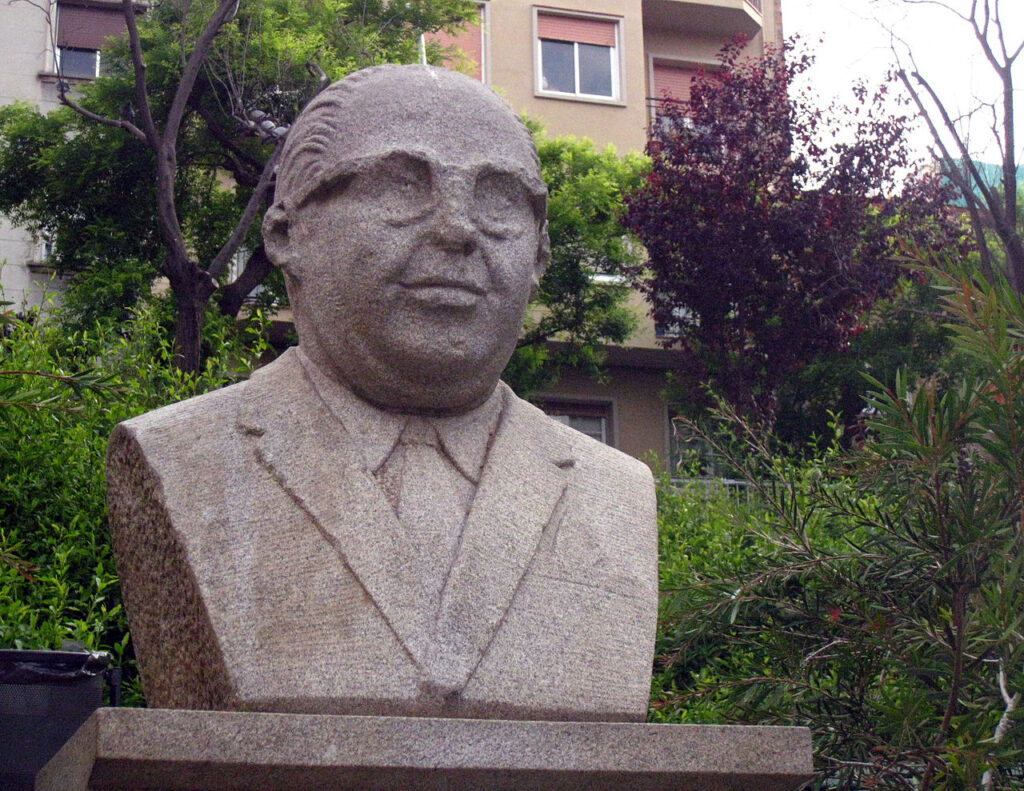Cunqueiro desarrolló un recurso literario un tanto olvidado que es hacer, de la descripción de la comida, más que la enunciación de una receta, un tránsito por donde la historia y sus personajes comiendo, se diluyen en un mismo caudal: la literatura.
Rober Díaz. Península 360 Press.

Álvaro Cunqueiro (1911-1981) es un escritor injustamente olvidado, pero no por ello menos erudito y ameno. La delicia del desparpajo con el que enfrenta sus lecturas lo hace salirse de las mazmorras en las que la corrección política lo han metido, su efecto deslumbrante y apasionado por donde los temas más peregrinos podían ocurrir y yuxtaponerse con temas históricos y de personajes famosos, relacionados con las estirpes europeas, guerras fratricidas, costumbres extravagantes, aunado a un saber culinario con el que creaba un microcosmos propio, hacen de este escritor, más que una forma de escribir, una categoría. Un estado de iluminación que, para quien no conozca su filiación política, causa una admiración casi automática por sus temas, y su forma tan inventiva al abordarlos.
Cunqueiro, nacido en Mondoñedo, Galicia, España, no creía en la inspiración. Era un escritor que, de un tajo, escribía lo que tenía comprometido. Se dijo que, si después de ese lapsus, la obra no estaba terminada, sería difícil, a la postre, verla concluida. Decía que uno no sabía para quién escribía y, a veces, no sabía a bien a dónde irían a parar los personajes, porque la paciencia, más que una virtud, es una de las principales herramientas con las que cuenta un escritor.
Además de novelista poeta y dramaturgo, Cuaqueiro desarrolló un recurso literario un tanto olvidado: es hacer de la descripción de la comida, más que la enunciación de una receta, un tránsito por donde la historia y sus personajes comiendo se diluyen en un mismo caudal: la literatura. Fue un experto gastrónomo y hacía de sus narraciones sobre comida una verdadera delicia; dejamos aquí una pequeña crónica histórica sobre «Las Fresas de Bretaña y las Moras», de su libro la «La cocina cristiana de occidente», pág. 45:
«Las fresas de Bretaña, las fresas de Plougastel, tienen historia. Son chilenas y por eso dicen fraises du Chili. Las trajo en 1712 un oficial de marina llamado Fraize, al regreso de un viaje. Son breves como amorodos —fresas—, sabrosas y frescas. El oficial Freize trajo del Brasil un papagayo y hermosas orquídeas. Vivía en Lenvoual, cerca de Plougastel, y pasa por uno de los tenorios bretones del s. XVIII. El propio Freize enseñó a tomar las fresas con nata a los bretones, postre que él había aprendido en Valparaíso, en casa de una señora oidora una jamona que era un trueno y a la que besó y abrazó el marino español «¡Aora vuelta!» (sic). Los ingleses compran fresas de Plougastel para sus confituras, como compran moras de septiembre para el black berry jam. Los bretones gustan de las moras con azúcar, canela y vino de Barsac; el mejor, un Château-Coutet anaranjado y dulce.»
Cunqueiro agregaba índices onomásticos ficticios al final de sus libros con la finalidad de completar los perfiles de los personajes y que, aquello que no hubiera dicho, quedara bajo la estela de la ficción histórica. Sus libros sobre comida, como sus apreciaciones y valoraciones sobre los platillos más insólitos y peregrinos, llenaron las páginas de los periódicos españoles de la posguerra.
Cuando le preguntaron para él que qué era Galicia, respondió que fue, por cientos de años, el punto final de la tierra conocida: el Finisterri, más allá de las rocas de sus acantilados –el punto del mundo en Galicia que los antiguos pensaron era el fin del mundo–, no había más que el océano tenebroso, con abismos donde nadaban peces gigantes que se comían su propia cola y que, cuando llegaron los romanos a conquistar esas tierras, creían que estaban de frente al Leteo, –aquel río por donde Dante dijo que se cruza hacia el más allá– por lo asombroso del paisaje, pero fue Décimo Junio Bruto, quien dirigía la expedición, que les recordó que estaban ahí sólo para conquistar y los soldados despertaron de su ensueño.
Los gallegos –dijo– siempre están a la defensiva, tienen un enorme amor por su tierra –seguramente debe haber pobladores de la Galicia que siguen poseyendo sus pequeñas tierras desde hace dos mil años–, ser ese fin del mundo y el acoso bajo el que vivieron, seguramente los hizo reaccionar para volverlos irónicos y unos pillos capaces de marear a quien fuese con su verborrea.
Un dato: En 2015, la alcaldesa de Madrid, Manuela Camarena, intentó cambiar el nombre de una calle que lleva su nombre, atendiendo la Ley de Memoria Histórica; el presidente de la institución académica gallega, Xesús Alonso Montero le contestó: «honor y gloria de las Letras Hispánicas del S.XX, fue amigo admirado por muchas personas del panorama ideológico republicano y un hombre bueno que nunca, en su condición íntima, se identificó con la violencia fascista; antes y después de 1936».

